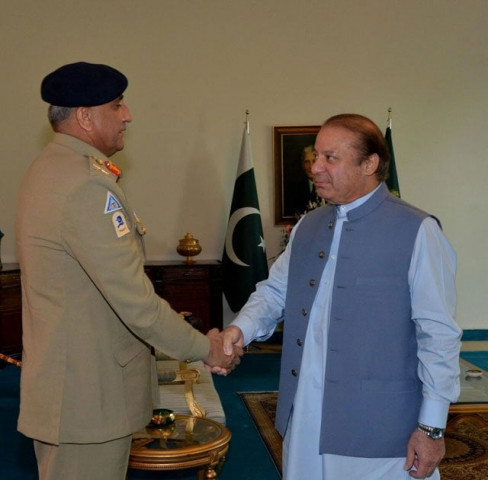Cross-border attacks mend civil, military ties
The three frontal foreign policy challenge warranted a joint response from the country’s civil and military...

A file photo of a meeting between army chief General Qamar Javed Bajwa meeting Prime Minister Nawaz Sharif. PHOTO: PM HOUSE
However, at around 2pm an internal memo of the Prime Minister Office on the Dawn leaks inquiry was leaked to the media. PM's special assistant on Foreign Affairs Tariq Fatemi and Principle Information Officer Rao Tehsin were removed from their respective positions.
The big news of the day was yet to come though.
At 2:52pm a tweet from the Director General Inter Services Public Relations (ISPR) was not less than a bombshell for the government. The army, through a tweet, termed the notification incomplete and publicly rejected the government’s move.
The unprecedented public snub from the army triggered widespread speculations and some even started comparing the situation to events before the 1999 military coup.
The government had an uneasy relationship with the security establishment under former army chief General (retd) Raheel Sharif.
But given the credentials and reputation of the incumbent army chief General Qamar Javed Bajwa because of which he was picked for the coveted job in November last year, very few had predicted that the government and military would come to this impasse within few months of the change of command.
While the civil and military leadership embroiled in bitter row on domestic issues, Pakistan faced an unprecedented foreign policy challenge. During the civil-military standoff on Dawn leaks, the country had to endure border situation from unusually three fronts — India, Afghanistan and Iran.
India accused Pakistan Army of beheading two of her soldiers along the Line of Control (LoC) whereas Afghanistan border guards targeted Pakistani security forces accompanying the census teams close to the border villages near Chaman.
Dawn Leaks controversy: Army recants ‘rejection’ tweet
If that was not enough, Iran also exerted pressure on Pakistan to act against militants allegedly responsible for recent cross-border attack killing 11 Iranian border guards. The Iranian military chief threatened to conduct operation against such militants inside Pakistan if the government did not act swiftly.
The three frontal foreign policy challenge warranted a joint response from the country’s civil and military leadership. However, impasse on the Dawn leaks had prevented the two institutions to come together and give an appropriate response.
Before the situation got worse, the civil and military leadership realised that the issue of Dawn leaks was creating unnecessary distraction from the real issues. And that was the starting point of rapprochement, according to officials familiar with the development.
Initially, the prime minister and the army chief discussed the way out through their intermediaries. Punjab Chief Minister Shehbaz Sharif and Finance Minister Ishaq Dar are believed to have held meetings with Chief of General Staff Lt General Bilal Akbar on the issue.
Those quiet interactions then culminated into the meeting between the prime minister and the army chief on Wednesday night.
The flurry of meetings between the civil and military leadership had helped the two sides to address some of the misgivings arising out of the mishandling of the Dawn leaks inquiry report.
The reason that led to the unprecedented tweet from the DG ISPR was the impression that the government did not honour the original commitment reached with the army. The army chief reportedly had already taken his military commanders into confidence and even shared findings of the inquiry report.
However, the army chief felt let down by the government on finding that the initial notification was not in line with what was agreed upon.
What led to the breakthrough was the unequivocal assurance given by the army chief that he would not undermine democracy under the garb of the Dawn leaks controversy.
He wanted the issue to be settled once and for all to the satisfaction of everyone including the rank and file within the army.
The urgency behind getting over with the standoff, however, was impending foreign policy challenges.
“The two sides realised that given the current foreign policy challenges, one needs to move beyond Dawn leaks controversy,” said one official, who added that the army chief strengthened his credentials as pro-democracy general when he agreed to withdraw the controversial tweet from the DG ISPR.
After the amicable solution, the civil and military leadership are set to discuss the more pressing issues such as border situation along India, Afghanistan and Iran.
Dawn Leaks notification: PM advises Nisar to remove all ambiguities
Speaking at a press conference in Rawalpindi, DG ISPR Major General Asif Ghafoor, after his initial statement on the Dawn leaks issue, consumed much of the time discussing those challenges.
Responding to the Indian allegations of mutilation of soldiers’ bodies, Maj Gen Ghafoor made it clear that Pakistan Army had never engaged in such inhuman acts. He recalled how a number of times Pakistan respectfully repatriated Indian soldiers, who inadvertently crossed over the border.
He also touched the border clashes at Chaman, saying that the incident should not have happened at first. He said Pakistan frontier corps officials were going to discuss the census issue with Afghan police when they come under attack.
He said Pakistani security forces were compelled to retaliate in self-defence.
When asked to comment on the recent threatening statement issued by the Iranian military chief, the spokesperson played down his remarks saying that he must have said this because of domestic situation.
Gen Ghafoor clarified that the situation was not bad along the Pak-Iran border as was being projected.
The DG ISPR also explained that Naureen Leghari, a medical student, was not a terrorist but was going to join the militant outfit. “We saved her in the nick of time. If we save our daughters from being used by terrorists, should we punish them or use them for correction of our society, he asked.



















COMMENTS
Comments are moderated and generally will be posted if they are on-topic and not abusive.
For more information, please see our Comments FAQ